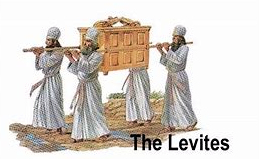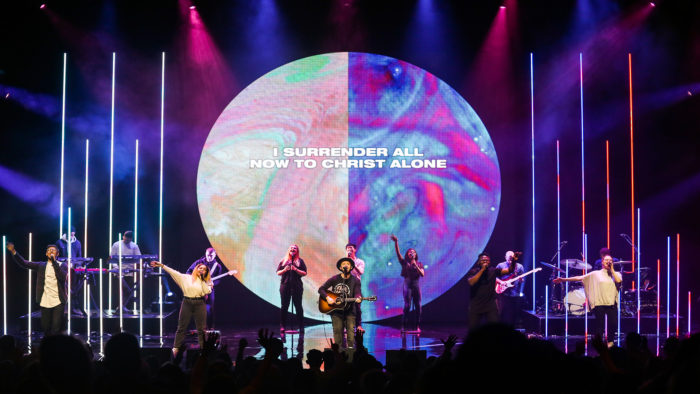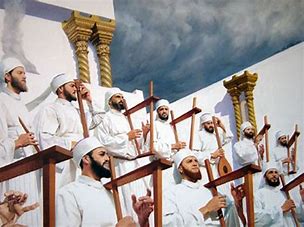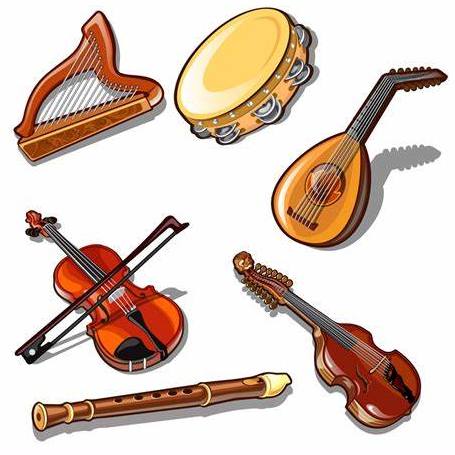Music in the Work of God

Scripture: – “Psalms:149” & “Psalm 150”
“All things were made by Him, and without Him was not anything made that is made” – “John 1:3”
Introduction: –
The value of music and its use in the House and Work of God is of such enormity that it is not possible to calculate it, or it’s effect both in the General Life, and the Individual Life, of the People of God. It is an area of Church Life that has invariably been underestimated, and in our day and generation been utilised by the enemy to undermine the doctrinal foundations long established.
Music and song continue to play a vital role in the life of God’s people today. It’s a fact of our contemporary culture and with all its modern technology that exciting and new possibilities surround us. Our lives are surrounded with music, we find it on the television and radio, the background music of video games, the music of shopping centers, CDs, and synthesizers. However, it would be true to say that much of the time music functions as “background” it’s akin to as the American say “Elevator Music” rather than as an opportunity for serious listening, much less participation. Unfortunately, much of the popular Christian music composed today is for performance rather than for participation.
We live in unique times when the Church has a greater access to and is encouraged to have a greater openness to a larger variation of musical genres and long may that continue – we have Classical hymns to Christian Rock, and everything in between. This great diversity of choice should truly be both welcomed and celebrated. Why? Because it is an example of the diversity and richness of God’s creation.
However, with all the variety and options available there is a significant requirement for greater discernment and care in planning and implementing the music ministry of the church. The people of God sing; what they sing and how they sing are important issues.

When we are evaluating and choosing the music for our corporate times of worship, I believe that it should be a very careful process that is entered. It should be guided primarily by theological considerations. There are many songs in common usage that are not doctrinally correct and through them the enemy has been given the ability to place a “little leaven into the lump which in turn leavens the whole.” – “1 Corinthians 5:6.” The Apostle Paul used a familiar proverb to illustrate his point, and to show that his concern is not overblown. Leaven, or yeast never remains isolated in a single spot within a lump of dough. It will always spread and become part of the entire loaf. In a similar way, false teaching either preached, taught in the context of study together or sung has consequences. It never limited to just a few people in a group. When discovered it is to be either rejected or removed or it will work its way into the thoughts and practices of a whole group and become part of the belief structures of individuals. False ideas are contagious like Covid19; they like it spreads and takes hold and likewise requires a “Lockdown” to solve it.

We will speak further in our study about musical instruments but let me re-iterate what Reformed theologian Karl Barth said “The Christian church sings. It is not a choral society. Its singing is not a concert. But from inner, material necessity it sings. Singing is the highest form of human expression.…What we can and must say quite confidently is that the church which does not sing is not the church. And where…it does not really sing but sighs and mumbles spasmodically, shamefacedly and with an ill grace, it can be at best only a troubled community which is not sure of its cause and of whose ministry and witness there can be no great expectation.…The praise of God which finds its concrete culmination in the singing of the community is one of the indispensable forms of the ministry of the church.”
It should be said that of all the musical instruments that may be employed in the praise of God, the human voice has priority – Other instruments are to be used primarily in the service of the singing of God’s people.
The dictionary defines music as a connected series of sweet sounds melody or harmony, and it is recognised to be a collection of vibrations that are given out at varying pitches, the musician arranging these vibrations to be pleasing to the ear. In “Job 38:7” we read “The morning stars sang (or vibrated) together, and the sons of God shouted for joy” and in reality initially Lucifer was given the task of orchestrating the heavenly choirs in their worship of God (and let me say he is an expert in its use to lead millions to perdition). Music is clearly seen in creation although we do not always recognise it as such. Thunder and Wind is music of a kind, and the bird’s singing merrily away, neither need to be taught, it is just part of God’s creative work.
In recent times, there has been a very strong move of the Spirit of God, and in many respects it is very similar to the move of God in King David’s time – see “1 and 2 Chronicles”, which we shall be looking at in more detail later.
Throughout the world the topic of Music in the Work and House of God is being brought to the forefront of Christian thinking and teaching. This new emphasis, has for the most part, resulted in a greater release of liberty and freedom in Praise and Worship, a stronger sense of the awesomeness and Holiness of God and to many an area of Ministry that can bring Deliverance and Anointing. Church’s that are growing and expanding are Church’s that are giving a high priority to the teaching and outworking of music in the overall worship and life of their fellowships.
It is not my intention, in this study, as a non-musician, to try and teach music to anyone, but to rather examine the Biblical Teachings and the Biblical Emphasis, that music has in Scripture and with the hope and desire that it may help in the discovery of a fresh sense of release and victory in God, and to see His order in it established.
Let me begin by saying, here at the commencement of this study that music is a God Appointed Ministry to HisPeople, and that all musicians, of whatever degree of talent and ability, who are involved in it, in a public manner, should recognise the fact, that they are involved in a spiritual ministry.
It’s a ministry – firstly unto the Lord, and secondarily to God’s People. All ministry should be seen and measured against the plumb line of Scripture. It is all too easy for a Church to have a Worship Team, i.e. a (Band of Musicians) who are not anchored to Biblical Principles, in regard to their ministry, and to do that which “just seems right”.
It has been the common practice in Church’s to see Musicians and Singers to be merely an attachment, an interlude, or a useful tool, to be used, whenever the mood or the situation required it. This is and has always been wrong.

The Bible says “There is a way that seems right unto a man, but the end thereof is death” – “Proverbs 14:12” and in many cases, Church growth has been stifled and spiritual dearth has entered because “MANS WAY and not GODS WAY” has been allowed to continue.

The Old Testament provides us with the basis upon which I shall begin to share my thoughts with you, because it is there that we see God firstly laying out the principles and the pattern, for all that would follow, in the way in which God showed Himself to be desiring Worship – it was Jesus who said “God is spirit, and his worshipers must worship in the Spirit and in truth.” – “John 4:24.”
God has been and always is looking for those who will worship Him in Spirit and in truth and it is in the Old Testament Scriptures, particularly those of “1 and 2 Chronicles” that we discover what He is saying.
The Ark of God, is seen in scripture to be the visible sign of God’s Presence and Covenant with the people of Israel, and when David became King, because he was a good King, with a heart to do God’s will, he wanted God’s presence to be central in the life of Israel. In order to do so it was essential that the Ark be brought back from Kirjath-jearim and in “1 Chronicles 13:3” it was said “And let us bring again the Ark of our God to us for we inquired not at it in the days of Saul.”
David, whilst being a good King, and having a good heart, was prone to impetuousness, as we all are. True, he was a hero of faith, but he like us, needed to learn through experience that there was a “right way and a wrong way to do things”, and here in his first attempt to bring the Ark back, although from a good motive point of view, was the right thing to do, in practice it was done in the wrong way.

In the following items of scripture – “Exodus 37:5” – “Numbers 4:15” – “Number 7:9” – “Numbers 10:21” – “Deuteronomy 10:8” – “Joshua 3:8-4” – “2 Samuel 15:24” we see provided for us very clear instructions how the Ark should be handled, carried and by whom. David in his enthusiasm ignored to obey or heed the Scripture, in “1 Chronicles 13:7-10” – “And they carried the ark of God in a new cart out of the house of Abinadab and Uzza and Ahio drave the cart. And David and all Israel played before God with all their might, and with singing, and with harps, and with psalteries, and with timbrels, and with cymbals, and with trumpets. And when they came unto the threshing floor of Chidon, Uzza put forth his hand to hold the ark; for the oxen stumbled. And the anger of the Lord was kindled against Uzza, and he smote him, because he put his hand to the ark: and there he died before God.” and as a result, the man Uzza died.
It is a salutary lesson and therefore essential that Leaders of God’s People heed what God says, particularly in matters that will effect directly His People and perhaps spoil the awareness of God’s Presence in the midst, and not to confuse excitement and enthusiasm, as in the case of David, with what is right.
The death of Uzza could have caused David to give up entirely but instead, he had the Ark removed to the home of Obed-edom, and in the intervening time he ensured that he knew what God’s Word had to say upon the matter, and in “1 Chronicles 15:1-3” and “1 Chronicles 16:1” we see him bringing the Ark of God to the place that God had established for it. In the past the Ark had been kept in Moses Tabernacle, now however it is obvious that God was doing a new thing, and it was to be in David’s Tent. So, a new thing was established.

It is my contention that the chief aim of God’s People is to Worship Him, and He is seeking for those that will do so, and above everything else, it is both our duty and privilege to do so, but as is the case in all matters that relate to God, there are Biblical ways in which we should go about it, and in regard to our topic of study, Music and Worship, we need now to turn to “2 CHRONICLES” to see what God established.
In the intervening period of time between David and Solomon and up until the time of Hezekiah, the worship of Israel had fallen on its face, they had failed to continue to follow the Pattern of David, and it is only when we get to Hezekiah that things begin to change again, and we see God establishing a Worship Team whose responsibility it was to provide a springboard for the worship of God’s people to gain new heights.
It was through individuals such as Joash, Johada and Hezekiah that things started to be get right, and the pattern of David established once again, and it does also point to an interesting item, and that is of maintaining (momentum). God had led the people in one direction and then a new breath of His Spirit directed them along another course, and we need to be aware of the breath of God’s Spirit also.
Different generations have differing ways of looking at things, and God dealing with people in different ways, it is no different with Music. The Old Hymn writers in their day and generation wrote under God’s Inspiration, Music and Lyrics which met the need of the day, but when God does a new thing, it is not possible to drag the 19th Century breath of God’s move into the 20th. Today we see ample evidence of things being stifled by doing so, and in any of the times of Restoration in Israel and in the Spiritual Israel, the Church of Jesus Christ, one of the prominent features is the pattern of David, as far as Music is concerned.
“2 Chronicles 29:25-29” reveals to us Hezekiah following the obvious leading of God’s Holy Spirit to establish again in the house of the Lord, individuals, who were the Levites, which we shall look at in more detail later, to be the Worship Leaders for all the people when they gathered together. God’s presence is the most important aspect of our gatherings together, and the Musicians and Singers play an intrinsic and vital part in it.
In that respect and before we look more closely at “2 Chronicles 29:25-29” let’s take a quick look at what the “Healthy Attitudes” of those who are in and aspire to be “In a Worship Team or Worship Leaders.” Why? Because a healthy culture isn’t something that can be fabricated, it’s essentially something that we “are.” Worship Team Culture should never be something that is just talked about, it will always be who they are.
Hillsong has defined a “Worship Team” as “…a team made up of volunteer musicians and singers who are passionate about contributing their musical gifts and talents to lead the church in heartfelt, passionate worship. The Worship team is a skills-based team.”

However, before we look further, I would suggest that the following attitudes and their respective commitments are an absolute foundation for any engaged in worship leadership. – Each has a corresponding question we can all ask of ourselves that will keep the culture of worship teams healthy and thriving and indeed all of us.
| 1 | Commitment to Learning | “How can I do this better?” – When I’m actively looking for opportunities to learn and grow in every situation, constructive criticism doesn’t come as an attack on me as a person but an answer to the question I’ve been asking all along. |
| 2 | Commitment to Serving | “How can I help you?” – No matter what we find in our hands to do, whether worship leading, operating a camera, changing microphone batteries or anything in between, our first question to each other and to our church should be ‘How can I help you?’ I’m here to help you, not the other way around. |
| 3 | Commitment to Excellence | “Is this my best?” – Excellence isn’t perfection, but it is my best, and my best means always getting better. |
| 4 | Commitment to Humility | “How can I demonstrate your value?” – “Philippians 2” highlights this so well. Jesus came to serve and lay down His life for us. We need to love and serve each other. It’s a ceaseless mission to place value on the people around me. |
| 5 | Commitment to Devotion | “What fruit am I producing?” – Am I exhibiting the fruit of the Spirit “Galatians 5:22” in my life more now than I was last year? If so, I’m devoted to the right thing. |
| 6 | Commitment to Ownership | “If this was ‘my problem’ what would I do differently?” – We bring solutions, not just problems. We fix things that are broken. We actively look for needs and gaps and we fill them. |
| 7 | Commitment to Others | “Who else can I include?” – I don’t hold tightly to “my thing” but actively look for ways to include others on the journey. This is our mandate. We are one body, each with a part to play “1 Corinthians 12” |
| 8 | Commitment to Unity | “Am I an island?” – Musicians, artists, lighting operators, singers, designers, photographers, dancers, audio engineers, film producers, stage managers, producers and writers. We are all part of the worship team and we are better together! |
| 9 | Commitment to Fun | “Do I take myself too seriously?” – No explanation needed. Don’t forget to laugh! Jesus said the that He came to give us joy. Church is to be enjoyed, not endured! |
| 10 | Commitment to the Cause | “If I was the only one, would I still be here?” – Family, friends, fun and a worship team to be a part of are all great reasons to serve each weekend. But deep down inside I know that, if I was the only one here, I would still turn up. Why? Because I believe in the cause of Christ. I believe in building what Jesus said He would build—His Church – “Matthew 16:18” |
None of us get these things right all of the time. But they’re important and godly commitments for us all to be aiming toward, both personally and collectively!
So, in “2 Chronicles 29:25-29” what do we learn from these verses?
God Instructed that there should be a Worship Team
The verses which we have read together already show to us this fact, and it is not without significance that it was not Hezekiah “off his own back” deciding on the matter, but the decision was based on “2 Chronicles 29: 25b” where it says “…according to the commandment of David and of Gad the Kings seer, and Nathan the prophet for so was the commandment of the LORD by his prophets.”
Now okay we are looking only so far at Old Testament Scriptures, and we might say, we are not Israel we are the Church of Jesus Christ. Well! That is true, but the Apostle Paul reveals to us very clearly in “Romans 11” that we are the spiritual Israel and in light of that the words from “Amos 9:11” come ringing through where it says “On that day I will raise up The tabernacle of David, which has fallen down, And repair its damages; I will raise up its ruins, And rebuild it as in the days of old” which is later spoken of in “Acts 15:16.” It is clear that it was God’s intention that when David’s Kingdom reign through the Messiah, Jesus (Yehoshua) was brought about, so there was to be a restoration of those principles also that God established in regard to Worship.
1a. The Worship Team Comprised of Levites Only

In the Old Testament Worship Team, only Levites were permitted to Serve the Lord in Musical Ministry, all the Musicians were Levites, (Levites were the Priests of the Lord). It was obvious that only those who were the TRUE PRIESTS of the Lord were permitted to do so, and in regard to that we must also see that only TRUE PRIESTS OF THE LORD can be allowed to serve the Lord in a frontline ministry, such as music.
The Bible tells us that Jesus Christ has made us Kings and PRIESTS unto our God, “He has made us a kingdom, priests (Levites) to His God and Father to Him be the glory and the dominion to the ages of the ages. Amen” – “Revelation 1:6” Berean Version. As the Spiritual Israel we are now, if we have surrendered our lives to Jesus Christ and are Born Again by the Spirit of God and have confessed Him as Saviour the Levites of God. It therefore is vital, both for the individuals concerned and for the Church of Jesus, that only those who are born again be permitted to carry be used in respect of the vessels of the Lord – lest the whole of a congregation suffer.
Only those who are Saved or the Levites i.e. Priests should be allowed to attempt to carry the presence of God, not only for their own sakes, as seen in the mistake made in “1 Chronicles 13” but also for the whole of God’s People.
At the same time however we must also recognise the fact that not all the Levites would have been gifted musically, and thus it is apparent that just because a person was a Levite, or in our own setting a Priest unto the Lord, through regeneration in Jesus Christ, that they are either gifted or called into a Musical Priestly Ministry.
The day are long gone when just anybody could pick up an instrument and play in the House of God, two basic criteria have to be seen, one Salvation in Jesus Christ and two a Calling into the Ministry of Music.
In “2 Chronicles 29:11” we read of a Calling to this work in the following words… “My sons, do not now be negligent, for the Lord has chosen you to stand in His presence, to serve Him, to be His ministers and burn incense to Him” and this calling manifested itself very clearly in the result.
In “2 Chronicles 5:11-13” we read “And it came to pass, when the priests were come out of the holy place; for all the priests there present were sanctified, and did not then wait by course; Also the Levites which were the singers, all of them of Asaph, of Herman, of Jeduthun, with their sons and their brethren, being arrayed in white linen, having cymbals and psalteries and harps, stood at the east end of the alter, and with them one hundred and twenty priests sounding with trumpets: It came even to pass, as the trumpeters and singers were as one, to make one sound to be heard in praising and thanksgiving the Lord, and when they lifted up their voice with the trumpets and the cymbals and instruments of music, and praised the Lord, saying, For He is good; for His mercy endureth forever: that then the house was filled with a cloud, even the house of the Lord.”
1b. The Levites were Special, Separated and Chosen Men
In the Old Testament the Levites of God, that served the Lord in a Priestly Ministry, were a Tribe especially chosen by the Lord to perform this role before Him.

If we look at “Numbers 3:13” and “Numbers 8:14”, this is clearly seen, particularly as we consider the context that surrounds these two verses. This characteristic is also seen clearly in the Spiritual Israel, because God has taken us, and now declares that we are “…in the world but not of it” – “John 17:14” He also declares that “we seek a Heavenly Kingdom, not made with hands that we are strangers and pilgrims” – “Hebrews 13:14” and the Levites of old had specific characteristics that qualified them for God’s Service, both in the Public Aspects of it and the Private.
There are specific things that further reveal to us their “specific and special separation plus their various roles.”
- Levites had God Alone as their Inheritance and Pursued Spiritual Values before Temporal Goals
In “1 Chronicles 16:4” we read “….And he appointed certain of the Levites to minister before the ark of the Lord, and to record, and to thank and praise the Lord God of Israel.” Those who minister either in song or in the playing of musical instruments need to evaluate their motives continually, to determine “Who am I doing this for?” The ministry must be both (for and to) God and personal ambitions and goals must fade into insignificance if the true blessing of God is to be upon that which we do.
- Levites Were Separated and Wholeheartedly Devoted to the Lord
- Levites Wore White Linen
“for the fine linen is the righteousness of the saints” – “Revelation 19:8” The White Linen reveals that their Lifestyle, was not the moral and upright style of the World i.e. Good People, but the Lifestyle of Jesus, born in us through new birth as in “John 3:16b”
In this regard also “1 Chronicles 15:27” says…“And David was clothed with a robe of fine linen, and all the Levites that bare the ark, and the singers, and Chenaniah the master of the song with the singers: David also had upon him an ephod of linen.” – this reveals that care needs to be taken in one’s appearance when publicly ministering before the Lord, when we become new creatures in Jesus, many things change, and one of these can even be our appearance.
As the Levites were the bearers of God’s presence it is appropriate that with such an awesome calling that they dressed in the finest of clothing.
- Levites Were Organised
I will simply enumerate here the ways in which they were Organised into their respective areas of work for the Lord.
| “1 Chronicles 15:16” | “Appointed to the Worship Team” |
| “1 Chronicles 16:4-14” | “Specifically Designated to the Work” |
| “1 Chronicles 15:17” | “Appointed to the Musical Leadership” |
Self-appointment leads ultimately to insecurity. There can only be a true identity when ministry has been recognised by the Church as a whole and then appointed into Leadership and released. Recognition is not merely being given label, and this is so on every form of Church Leadership from the Senior Leaders right through to those doing the Church Cleaning.
- The Levites Submitted themselves to Leadership
In “I Chronicles 15:22” we see this “Kenaniah the head Levite was in charge of the singing; that was his responsibility because he was skillful at it.”
A true mark of servanthood is that of submission, Jesus calls us all to be “servants one of another” and in the realm of music anyone who wishes to function in this ministry without being accountable to the overall leadership will be at best troublesome, and given too much leeway, dangerous.
1a. The Levites Saw Their Responsibility to Be There
The Levites clearly understood that in their CHOOSING by the Lord and their SEPARATION into Musical Ministry and likewise into any other type that they did not decide for themselves to minister before the Lord. “1 Chronicles 6:37” indicates this very clearly where it says – “…David left Asaph and his associates before the ark of the covenant of the Lord to minister there regularly, according to each day’s requirements.”
1b. The Levites Saw Their Responsibility to Lift the Congregation
It was the command of that they should lift their voices with joy this is a contagious element. It is the job of the music team to with their joy and boldness, to lift the congregation of God’s people into praise and worship “1 Chronicles 15:21” – “…and Mattithiah, Eliphelehu, Mikneiah, Obed-Edom, Jeiel and Azaziah were to play the harps, directing according to sheminith.” and “1 Chronicles 15:16” – “David told the leaders of the Levites to appoint their fellow Levites as musicians to make a joyful sound with musical instruments: lyres, harps and cymbals.”
1c. The Levites Saw Their Responsibility to Create the Right Environment
Music can stir people and creates moods and feelings, it can evoke all kinds of emotions, from aggression to gentleness, from sadness to pride in a nation, and make us laugh or even cry.
The medical world has recognised that music is therapeutic and a significant aid to the restoration of both physical and mental health. The advertising world realises that if the right type of music is played in Supermarkets, we will be encouraged to purchase more. Thus it is vital that the Christian Levite involved in musical ministry recognises that a great responsibility rests upon them, and through them God will want to release His people, this release can even bring us into prophecy “1 Samuel 10:5” and “2 Kings 3:15”.
The Musical Levites were Skilled
Skill has been defined by some as “A Deposit of Gods Wisdom” and the Levites that were specifically chosen from the congregation of the Levite Tribe to Minister to the Lord in Music were a Skilled Team. In no way does that indicate that were perfect, and that nothing more could be learned, or indeed that they did not need to practice no! It meant that God’s Abilities were available to them, as they “waited upon their ministry” andsought Him for their enabling.
Look with me into “1 Chronicles 25:7” – “Along with their relatives all of them trained and skilled in music for the Lord – they numbered 288” NIV and also into “2 Chronicles 34:12” – “And the men did the work faithfully. Their overseers were Jahath and Obadiah the Levites, of the sons of Merari, and Zechariah and Meshullam, of the sons of the Kohathites, to supervise. Others of the Levites, all of whom were skillful with instruments of music…” NKJ
In regard to the wisdom aspect we should note that there should be a blending of both the “Skill through Instruction accompanied by the Skill through the Spirit or Inspiration” and “Exodus 28:3” and “Exodus 31:1-3” shows this to us clearly.
- “And thou shalt speak unto all that are wise hearted, whom I have filled with the spirit of wisdom, that they may make Aaron’s garments to consecrate him, that he may minister unto me in the priest’s office.”
- “Then the Lord said to Moses, “See, I have chosen Bezalel son of Uri, the son of Hur, of the tribe of Judah, and I have filled him with the Spirit of God, with wisdom, with understanding, with knowledge and with all kinds of skills”
In everything, the Musical Levites were Developed Instrumentally, and were both Prophetically and Committed in all they did, relevant to their day and generation and innovative in their methods.
Now that we have considered together some of the foundational aspects of how music, and it’s usage in ministry before the Lord, and it’s use by the Holy Spirit to magnify and glorify God, it would be well for us to consider further together some of the more practical aspects of its use amongst the people of God.
Two specific and important things need to be avoided in this day when music is taking such a prominent forefront, and these are: –
- Music and Songs being Worshipped.
- Music and Songs being a means of AVOIDING Personal Expression of our Love and Devotion.
In our day and generation both of these “to be avoided” aspects are prevalent. There was a time when congregations were personally involved in vocal worship – Now however the majority of “especially the larger Churches” never engage in this. It is simply a string of songs that are “exciting, motivational and at times Scripturally in-correct” without any time for the Children of God to actually (Personally lift their voices in praise) in the midst of a congregation.
Music is mentioned in the Bible over 839 times and there are over 200 scriptures that tell us to sing and the Psalms can really be described as God’s Songbook, in fact it is the longest book in the Bible.
Many types of instruments were used in the worship of God, and they fell into three categories.

- Stringed
- Wind
- Percussion
- Stringed – These were the Psaltery and Harps found in “1 Chronicles 15:20” being made of wood with strings of gut.
- Wind – These were the Flutes, Ram’s Horns and Silver Trumpets, and were used on differing occasions.
- Flutes, these led dancing, played at weddings, and were used for lamentation.
- Ram’s Horn were used as backing instruments, and as a call for proclamation and the military.
- Silver Trumpet were used by the priests to call people to services and for the beginning of battles.
- Percussion –These were the Timbrels played by women and utilised to beat time and the Cymbals of Brass were also used. Chris Bowater in his book the Singer and the Song brings out the following points, that are important for us to recognise regarding how music is used in Scripture.
Music Brings Us into The Presence of God
- “Come before His presence with singing” – “Psalm 100:2”
- “Let us come before Him with thanksgiving and extol Him with music and song” – “Psalm 95:2”
We do wrong as the redeemed of the Lord to come before God with a mentality that speaks of “pleading and crawling” all the time scripture is reminding us to come with boldness and thanksgiving and because of our acceptance in the beloved, we are able to come with gladness and joy, there is now no condemnation. We need to recognise that reality, and in music this acceptance is expressed very forcibly.
Music Prepares us for the Word of God
- “…while the harpist was playing, the hand of the Lord came upon Elisha and he said this is what the Lord says…” – “2 Kings 3:15-16”
- “…while they were worshipping the Lord and fasting, the Holy Spirit said…” – “Acts 13:2”
It is a wise move on the part of any worship leader to enquire of the speaker as to the general theme and content of his or her message, in that way, the songs and the direction of the music and worship can be led in such a way that God’s Word can have its maximum impact.
Music is Commanded to be part of our Daily Lives
- “Sing to the Lord a new song; sing to the Lord, all the earth. Sing to the Lord, praise His name; proclaim His salvation day after day” – “Psalm 96:1-2”
- “Speaking to one another with psalms, hymns and spiritual songs…” – “Ephesians 5:18-19”
In Scripture time and time again, in both the good and bad times, it was the testimony of the Saints of God that they rejoiced with singingbefore the Lord. It was as essential to them as their daily intake of food and water.
Music is used in Spiritual Warfare
- “May the praise of God be in their mouth and a double-edged sword in their hands, to inflict vengeance on the nations and punishment on the people, to bind their Kings with fetters…” – “Psalm 149:6-8”
- “As they began to sing praise, the Lord set ambushes against the men of Ammon and Moab…” – “2 Chronicles 20:22”
Songs of warfare that declare the mighty works, power and goodness of God brings us to a place of putting confidence in Him alone. God wants us to trust Him unreservedly. The “all-sufficient” God has real problems with self-sufficient people.
Songs birthed and rooted in the Word of God eventually become part of us and our daily living, causing us to be overcomers and more than conquerors, instead of being those who experience continual defeat and discouragement. By placing God in His rightful place in our confessions (through song) we are also re-affirming that Satan too has a place reserved for him – Where? Beneath our feet!
Music can be utilised as a powerful tool in the hands of God’s children, and to illustrate this point let me point you to three scriptures.
- “Acts 16:25-26” – “…and at midnight Paul and Silas prayed and sang praises unto God; and the prisoners heard them. And suddenly there was a great earthquake…” The songs of Paul and Silas brought God’s power into action.
- “1 Samuel 16:23” – “…and it came to pass, when the evil spirit from God was upon Saul, that David took an Harp, and played with his hand; so Saul was refreshed” and the evil spirits were sent packing by the inspired playing.
- “2 Kings 3:15” – “And it came to pass, when the minstrel played, that the hand of the Lord came upon him” Prophetical utterances were encouraged through its use.
Here are eleven thought provoking questions that perhaps we should ask ourselves, there are of course many others: –

| 1 | What basic theology is being expressed in and through our congregational singing? |
| 2 | Is what we are singing firstly biblical? And is it consistent with our theology? |
| 3 | Do the songs we sing express the whole range of the “whole counsel of God?” |
| 4 | What are the songs and hymns we sing saying or maybe implying in respect of the sovereignty of God, grace of God? What do they say about the basic doctrines of Scripture about the life, death, resurrection, and ascension of Jesus Christ? |
| 5 | How appropriate are the songs we sing to the variety life situations in which believers find themselves? |
| 6 | Does our congregational singing incorporate the many moods and types of prayer, including praise, thanksgiving, confession, lament, intercession, and dedication? A congregation which sings only “upbeat” praise choruses and hymns, for example, will have a diminished and restricted understanding of prayer. |
| 7 | Are the hymns and songs we are singing making the full use and encompass the full range of biblical imagery for God? |
| 8 | Do the songs we sing and use for worship cause all believers, male and female, young and old, to feel included by the language of our songs? |
| 9 | Does our music encourage corporate worship? |
| 10 | Do our musical selections respect the past practice of a congregation? |
| 11 | Do the hymns and choruses we sing express the overall faith of a gathered community or do they tend toward individual and private expressions of faith? |
Conclusion: –
It has been my intention in this study of Music in God’s Work to illustrate by example and common sense, but moreover through God’s Word itself, to lay down for us the scriptural guidelines that we as the Church of Jesus should be following and outworking in our Worship, Praise and Service lives before the Lord and to one another.
It may quite possibly be the case that there are amongst the readers who wish to be involved in the Musical Ministry of a fellowship, and if this is the case we would suggest that you give yourself prayer in regard to those things that we have learned together through this study and contact your Church Leaders.
